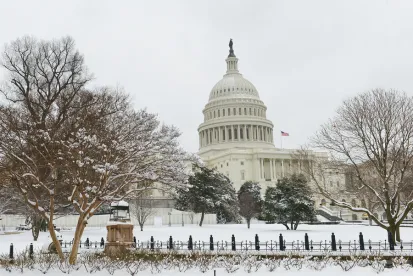Legislative Activity
House Subcommittee Advances Spectrum Bill and Broadband Deployment Package
On December 2, the Communications and Technology Subcommittee (Communications Subcommittee) of the House Energy & Commerce Committee (House Commerce Committee) advanced two pieces of legislation to the full committee. The first, H.R.1641, the Federal Spectrum Incentive Act of 2015, was approved by voice vote. The bill will provide financial incentives to encourage government agencies to vacate their existing frequencies with the goal of freeing up spectrum for commercial and other uses. The legislation states that federal agencies that auction off their spectrum can receive some of the proceeds from the sale from a designated Federal Spectrum Incentive Fund to be administered by the Office of Management and Budget (OMB) in consultation with the National Telecommunications and Information Administration (NTIA). A press release from Representative Doris Matsui (D-CA), a cosponsor of the bill, stated that the legislation is “an important step in the growth of our wireless economy.”
On the same day, the Communications Subcommittee approved a draft bill aimed at promoting broadband infrastructure deployment. The bill combines a number of legislative proposals that have previously been put before the full committee and the subcommittee. Specifically, the bill would do the following:
-
require the installation of broadband conduit in any federally-funded highway project where the Department of Transportation (DoT), the NTIA, and the Federal Communications Commission (FCC) find that the capacity will be needed in the next fifteen years (known as the “Dig-Once” provision);
-
require federal agencies to use common forms, contracts, and fee schedules;
-
expand access to pole attachments for deployment of broadband;
-
create an inventory of federal broadband assets and assign responsibility for the tracking of federal permit applications for broadband facilities;
-
require agencies to streamline their permitting processes for locating broadband facilities; and
-
streamline federal requirements for historical and environmental impact evaluations of broadband facilities.
The draft bill was the work of a bipartisan coalition including House Commerce Committee Chairman Fred Upton (R-MI), Ranking Member Frank Pallone (D-NJ), Communications Subcommittee Chairman Greg Walden (R-OR) and Ranking Member Anna G. Eshoo (D-CA).
Both the spectrum bill and the draft broadband package now go to the full committee for consideration.
Bill Introduced to Improve 911 Accessibility
On December 3, Rep. Louie Gohmert (R-TX) introduced H.R.4167, Kari’s Law Act of 2015. The bill is a response to the 2013 murder of Kari Rene Hunt in Marshall, Texas. Ms. Hunt was murdered by her husband in a hotel room. Ms. Hunt’s 9 year old daughter attempted to dial 911 from the hotel phone but was unable to connect because she did not dial “9” to reach an outside line. The episode attracted the attention of FCC Commissioner Ajit Pai who, in 2014, announced his intention to look into 911 issues. The legislation would require multi-line telephone systems, like that of a hotel, to maintain a default configuration allowing users to directly initiate a call to 911 without dialing any additional digits, codes, or prefixes. The bill has been referred to the House Commerce Committee for consideration.
This Week’s Hearings:
-
Wednesday, December 9: The Senate Committee on Commerce, Science, and Transportation will hold a markup during which it will consider S.2319 that would require spectrum auction deposits to go directly to the U.S. Treasury, rather than to interest-bearing accounts. It also will consider the renomination of FCC Commissioner Jessica Rosenworcel.
Regulatory Activity
FCC Seeks Comment on Petitions for Reconsideration of Incentive Auction Procedures
On December 3, the FCC released a Public Notice seeking comment on three petitions for reconsideration of the Broadcast Incentive Auction Application Procedures Public Notice released by the FCC on October 15. The petitions were filed on November 30 by: (1) T-Mobile USA, Inc.; (2) PBP Group, LLC, Bulloch Cellular, Inc., Pineland Cellular, Inc., and Planters Rural Cellular, Inc. (PBP Group et al.); and (3) Walker Broadcasting Company.
T-Mobile’s petition asks that the FCC declare that DISH Network, Northstar Wireless, and SNR Wireless LicenseCo are “considered ‘former defaulters’ under the Commission’s rules and, as such, requir[e] that they provide a 50% higher upfront payment if they wish to participate in the upcoming incentive auction.” Northstar and SNR Wireless defaulted on licenses purchased in the AWS-3 auction after the FCC denied Designated Entity (DE) bidding credits to those entities on a finding that they were under de facto control of DISH Network in an August 18 Memorandum Opinion and Order. The DE program was, according to the FCC, established to “ensur[e] that small businesses” and certain other groups “are better able to compete with larger entities in the acquisition of spectrum in Commission auctions.”
PBP Group et al.’s petition asks that the FCC reconsider its decision to “limit[] eligibility for the Rural Service Provider Bidding Credit to applicants that are ‘service provider[s] . . . in the business of providing commercial communications services,’ [which] would exclude a non-service provider that is wholly owned by rural service providers.”
Walker Broadcasting Group’s petition seeks reconsideration of an FCC Order “excluding Walker as an eligible participant in the Incentive Auction” and states that “Walker meets all the requirements and prerequisites for inclusion in the Incentive Auction.”
Oppositions to the petitions must be filed within 15 days of the publication of the Public Notice in the Federal Register (which is pending); replies to oppositions must be filed within 10 days of when oppositions are due.
FCC Seeks Comment on Petition for Reconsideration of Backup Power Order
On December 2, the FCC released a Public Notice seeking comment on a petition for reconsideration filed November 16 by the National Association of State Utility Consumer Advocates and other groups (NASUCA et al.) of the Backup Power Order released by the FCC on August 7. In the Backup Power Order, the FCC established a requirement for providers of a “Covered Service” – defined as any “facilities-based, fixed voice service offered as a residential service . . . that is not line powered” (for example, voice service provided via fiber to the home) – to offer a backup power system with the Covered Service and make certain related disclosures to the consumer informing them of the need for and capabilities of the backup power system. NASUCA et al.’s petition requests reconsideration because the rules adopted “depart from the approach taken in the Notice of Proposed Rulemaking . . ., transfer the responsibility for ensuring the reliability of 911 and other emergency voice communications from the provider to the consumer, and undermine the public safety and other policy goals” of Section 151 of the Communications Act.
Oppositions to NASUCA’s petition must be filed within 15 days of the publication of the Public Notice in the Federal Register (which is pending); replies to oppositions must be filed within 10 days of when oppositions are due.
FCC Seeks Comment on Petition for Reconsideration of Copper Retirement Order
On December 4, the FCC released a Public Notice seeking comment on a petition for reconsideration filed November 18 by U.S. TelePacific Corp. of the Copper Retirement Order released by the FCC August 7. In the Copper Retirement Order, the FCC took certain measures to “ensure that consumers are able to make informed choices and that new retail services meet consumers’ fundamental needs” during the transition of legacy time-division multiplexing (“TDM”) facilities to Internet Protocol (IP)-based networks, including requiring incumbent local exchange carriers (ILECs) to provide notice of removal of copper facilities, as well as certain measures to “ensure competition thrives as our networks continue to transition.”
U.S. TelePacific’s petition seeks “clarification regarding the interplay between the Section 251(b) retirement process and the Section 214(a) discontinuance process in the event that an ILEC copper loop retirement leads to a [competitive local exchange carrier (CLEC)] having to discontinue provision of service to a community or part of a community.” Specifically, U.S. TelePacific states because there is “no explicit requirement that an ILEC file a Section 214 discontinuance application when its copper retirement results in a CLEC discontinuance of service,” if an ILEC retires copper but does not discontinue TDM services in the relevant community, it is possible that the CLEC would be forced to discontinue its retail services while still completing its Section 214 discontinuance application and transitioning customers to alternative service providers.
Oppositions to U.S. TelePacific’s petition must be filed within 15 days of the publication of the Public Notice in the Federal Register (which is pending); replies to oppositions must be filed within 10 days of when oppositions are due.





 />i
/>i

